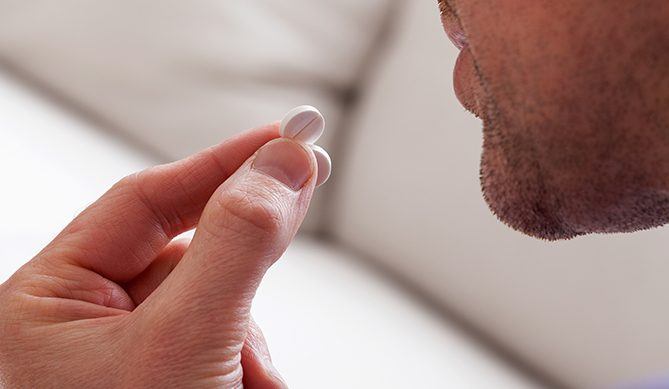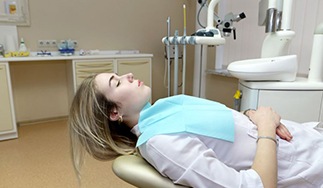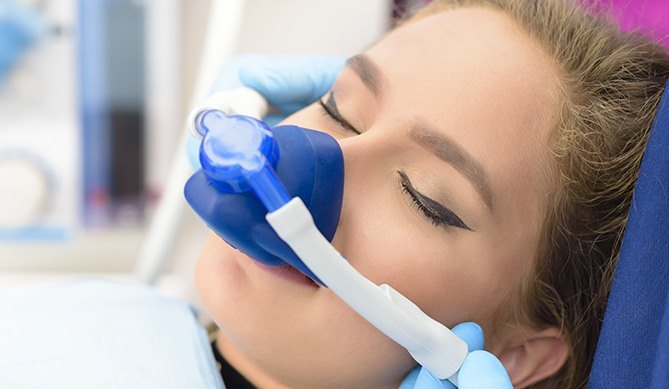Sedation Dentistry - San Antonio, TX
How We Help Patients
Stay Calm & Cool

Dr. Lorenzana and the rest of our team completely understand that many patients who come to see us are extremely nervous. Most have never undergone any type of periodontal care or oral surgery before! In order to ensure a relaxing appointment for absolutely everyone, we’re happy to offer sedation dentistry. It, along with our friendly and knowledgeable staff, will help ease your mind in and out of the chair so that by the time we’re done and your smile is renewed, your only thought will be, “You’re done already?” If you’re thinking about getting dental implants or periodontal therapy, call us today to learn how we can use sedation dentistry in San Antonio, TX to make your experience as comfortable as possible.
Why Choose Lorenzana Periodontics
for Sedation Dentistry?
- Sedation Available for Every Type of Procedure
- Fully-Tailored To Ensure Complete Patient Comfort
- Friendly Staff That Takes Your Concerns Seriously
IV Sedation Dentistry

For patients with extreme dental anxiety, those who require extensive care, or someone who just wants to have multiple procedures completed in a single appointment to save time, IV sedation is often the ideal solution. A sedative is administered directly into the bloodstream, which causes a patient to become extremely relaxed very quickly. With this method, we can adjust a patient’s sedation level in real time to ensure they feel at ease during every moment of their visit.
Oral Conscious Sedation

If you could take a pill that would make all your dental nerves go away, would you do it? If you’re like most patients, the answer is a resounding “Yes!” and that’s exactly what you can experience with oral conscious sedation. You’ll be prescribed medication to take at home on the day of your visit. By the time you reach our office and sit in the chair, it should already be working, so you’ll be completely relaxed before we ever start your treatment. You’ll remain awake the whole time and be able to respond to basic commands, but the appointment will seem to fly by, and you’ll likely have little to no memory of it afterward.
What Is Oral Conscious Sedation?

Instead of relying on needles or a face mask to administer a sedative, oral conscious sedation uses a small pill that you swallow shortly before your treatment is scheduled to begin. The medications commonly used for this purpose include Valium, Ativan, and Halcion.
Oral conscious sedation is powerful; its effects should kick-in within 15 minutes of when you take the pill, and you may remain calm and relaxed for several hours.
How Does Oral Conscious Sedation Work?

Oral conscious sedation induces a powerful feeling of relaxation, but it does not cause unconsciousness. Even if you drift off to sleep while under its influence, it should be easy for our team to awaken you. As the effects wear off after your appointment, you may find that you have no memory of your procedure. Many patients like this mild amnesiac effect. Because the sedative can make you feel tired and groggy, you should have a trusted adult ready to drive you both to and from your appointment.
Are You a Good Candidate for Oral Conscious Sedation?

Oral conscious sedation might be a good choice for you if:
- You struggle with moderate to severe dental anxiety or fear.
- You have a strong gag reflex.
- You are not easily numbed by local anesthesia.
- You have a medical condition that makes it difficult for you to sit still in the treatment chair for an extended period of time.
- You have had traumatic dental experiences in the past.
- You must undergo multiple or complex procedures in a single appointment.
Nitrous Oxide Sedation Dentistry

Also known as “laughing gas,” nitrous oxide sedation offers a gentle and fast-acting way to take the edge off of dental nerves that has been used by doctors for over 100 years. A patient simply inhales the gas mixed with oxygen through a small nasal mask, and this will make them feel happy, calm, and slightly numb all over. The mask stays on for the entire appointment, and once it’s removed, the gas’s effects dissipate almost instantly.
Learn More About Nitrous Oxide Sedation
Sedation Dentistry FAQs
Is Sedation Dentistry Safe?
When administered by a trained professional, sedation dentistry is incredibly safe. While any drug involves some risks, we will take the time to understand your medical history in order to ensure that we’re administering the correct sedative and dosage. We’ll also closely monitor your vitals for the duration of your procedure, ensuring that you’ll be both safe and comfortable for as long as you’re sedated.
Is Sedation Dentistry Safe While Pregnant?
While pregnant, sedatives are able to pass through the placenta and into the fetus. During the first trimester this could cause to problems with fetal development, and during the third trimester it could lead to premature labor. For this reason, it’s usually a good idea to refrain from getting sedated during pregnancy, or to use the minimal amount possible if it’s absolutely necessary.
Is Sedation Dentistry Covered by Insurance?
Typically, sedation is considered to be an elective treatment by insurance companies, which means that it usually isn’t covered.
There are occasionally exceptions in circumstances where sedation is deemed to be necessary in order to get dental care. This is the case for patients with disabilities like cerebral palsy or autism that make it difficult to sit still for the duration of a treatment. It may also be covered in the case of intensive procedures, like multiple tooth extractions.
How Long Does Dental Sedation Last?
This varies depending on what variety of sedation you’re using. Nitrous oxide, for example should fade withing minutes of the flow of gas stopping. Oral conscious sedation, however, will last for a long time after you initially take the pill, potentially leaving you feeling groggy for the rest of the day. The same is true for IV sedation.
In any case, it’s usually a good idea to get a ride home after your treatment just to be safe. You should also refrain from operating any heavy machinery for a 24 hours after the treatment.
Sedation Dentistry FAQs
Will I Remember Anything After Dental Sedation?
While you will remain technically awake while receiving dental sedation, you may have difficulty remembering the details of your procedure afterward. IV sedation is more likely to produce an amnesiac effect than oral conscious sedation or nitrous oxide treatments, and this may be beneficial for patients who suffer from severe dental anxiety or phobias since it can prevent the formation of stressful new memories.
What Does It Feel Like to Receive Dental Sedation?
The feeling that comes with dental sedation depends on the treatment you are receiving, and some patients may react differently than others. Nitrous oxide, for example, will leave you feeling relaxed, light, and slightly euphoric, and you may experience a slight tingling sensation in your arms and legs. Oral conscious sedation will give you an even deeper sense of relaxation, and you may have difficulty speaking or staying awake while feeling its effects. Some patients receiving oral conscious sedation report that their bodies feel heavy and that time seems to pass more quickly. IV sedation produces effects much like those of oral conscious sedation, but they will be even stronger and longer lasting.
Does Dental Sedation Make You Behave Strangely?
Dental sedation will help you stay still and calm and reduce your sensitivity to pain while receiving treatment at Lorenza Periodontics. While you have probably seen sedation treatments portrayed as causing patients to hallucinate, behave erratically, or reveal sensitive information on television or in movies, these portrayals are not true to life. Dental sedation will not make you do anything you would not do normally, and you will not hallucinate or become more likely to tell secrets. Even if you do say something silly or embarrassing while sedated, the team at Lorenzana Periodontics will never discuss it afterward.
How Long Does It Take to Recover After Sedation Dentistry?
The recovery time required for dental sedation depends on the treatment you receive. Nitrous oxide, for example, will be completely eliminated from the body within minutes after the treatment ends and has no lingering side effects, so you can expect to be able to drive home or return to work after your procedure. The effects of IV sedation, on the other hand, can last for up to twenty-four hours, and oral conscious sedation usually requires several hours to wear off. If you are receiving IV or oral conscious sedation, you will need a trusted individual to drive you to and from our San Antonio office and keep an eye on you while you are recovering.

